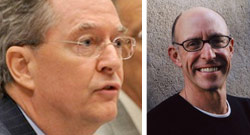
Americans know we can do better. When we find out that our air, water, food and homes are tainted with dangerous substances, we don't wait around for somebody else to fix things. We use our power in the marketplace to press for change.
The 2011 version of EWG’s Sunscreen Safety Guide was able to recommend 20 percent of more than 600 beach and sport sunscreens evaluated by our researchers. That was a significant improvement over 2009, when we could recommend just 8 percent of 500 products.
In June 2011, the federal Food and Drug Administration announced sunscreen regulations it had promised since 1978. As EWG has advocated for years, the FDA rules barred the use of misleading terms “waterproof,” “sweatproof” and “sunblock.” Because most sunscreens do not adequately protect people from harmful UVA radiation, EWG will continue to press for better products that truly protect users.
EWG’s 2010 Sunscreen Guide warned that retinyl palmitate, a form of vitamin A found in many U.S. sunscreens, might accelerate development of skin tumors when applied to the skin in the presence of sunlight. The industry attacked the EWG report, which was based on data from an unpublished government study. In January 2011, a key science advisory panel of the National Institutes of Health confirmed that retinyl palmitate may be carcinogenic on sun-exposed skin. As a result of EWG’s groundbreaking work, vitamin A use in sunscreens has declined from two-fifths of sunscreens analyzed by EWG in 2010 to one-third in 2011.
In June EWG published the 7th edition of the EWG Shopper’s Guide to Produce. Its ratings of the pesticide loads on common fruits and vegetables were featured in nearly every major newspaper in the U.S., it garnered 1,700 mentions in the news and 30,000 Facebook shares.
EWG’s study, "Flat-out Risky," focused on cancer-causing formaldehyde in expensive hair straighteners. It was based in part on unpublished injury reports on file at the FDA and obtained through the Freedom of Information Act.
EWG filed a citizen petition with FDA asking the agency to order makers of hair straighteners to stop false or misleading labeling of formaldehyde content and to put warning labels on their products. We urged the FDA to consider banning formaldehyde from hair care products.
FDA issued a warning letter to the makers of Brazilian Blowout, the most popular formaldehyde-based hair straightener. California's attorney general's office fined Brazilian Blowout $600,000 and ordered it to stop deceptive advertising.

In 2011, Forbes published Michael Pollan's list of the most powerful people in the food movement. EWG President Ken Cook was among them, alongside First Lady Michelle Obama and New York Times food columnist Mark Bittman.



















